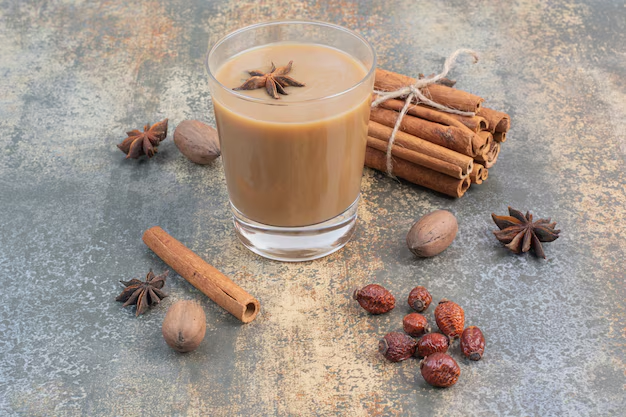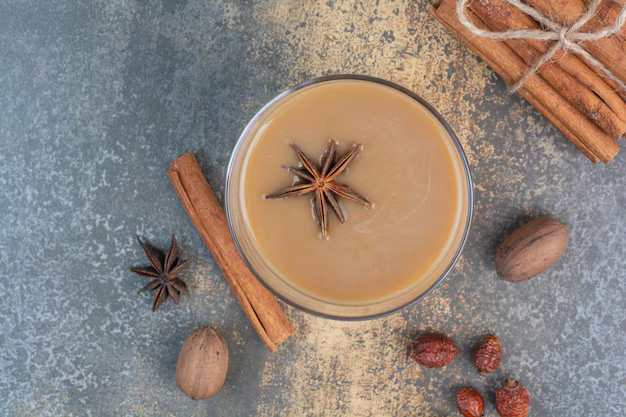Chai latte is a popular drink loved for its warm, spicy, and comforting flavors. A blend of black tea, milk, and aromatic spices, it offers a delightful alternative to coffee. But does chai latte have caffeine?
For caffeine-conscious drinkers, knowing how much is in their cup is important. This article explores the caffeine content in chai lattes and compares it to other beverages, helping you make informed choices.
What Is Chai Latte?
History and Origin of Chai Latte
The word chai comes from the Hindi word for tea, which traces its origins to India. Traditional chai, or masala chai, is a spiced tea made with black tea, milk, and spices like cardamom, cinnamon, and ginger. The chai latte, a Western twist, emerged by blending this traditional tea with frothy steamed milk, mimicking a coffee latte.
Ingredients Commonly Used in Chai Lattes
A typical chai latte includes:
- Black tea as the base.
- Milk (dairy or non-dairy alternatives like almond, oat, or soy milk).
- Spices such as cinnamon, cloves, ginger, cardamom, and sometimes nutmeg.
- Sweeteners like honey or sugar, depending on preference.
Chai Latte vs. Traditional Chai Tea
While traditional chai is robust and often homemade, a chai latte is smoother and sweeter, thanks to steamed milk. It’s more similar to coffee-shop-style drinks, appealing to those who prefer creamy beverages.
Does Chai Latte Have Caffeine?
Yes, chai latte does contain caffeine. Its caffeine comes from black tea, the main ingredient in most chai blends.
Caffeine in Black Tea
Black tea is naturally caffeinated, though it contains less caffeine than coffee. An 8 oz cup of black tea typically has about 40-70 mg of caffeine.
Brewing Process and Caffeine Levels
The amount of caffeine depends on how the tea is brewed. Longer brewing times extract more caffeine from the tea leaves. The concentration of black tea in the chai mix also matters. Pre-made chai concentrates, often used in cafes, may have less caffeine than freshly brewed chai.
Caffeine Content in a Standard Chai Latte
On average, an 8 oz chai latte contains about 50-70 mg of caffeine. This amount varies based on the recipe, tea-to-milk ratio, and brewing method.
Comparing Caffeine in Chai Latte vs Other Beverages
Comparison With Coffee
Coffee is much stronger in caffeine content. An 8 oz cup of coffee contains about 95-200 mg of caffeine, depending on the roast and brewing method. Compared to coffee, a chai latte has roughly half or even less caffeine.
Comparison With Green Tea
Green tea has a lighter caffeine profile, with around 25-50 mg per 8 oz cup. Chai latte generally has slightly more caffeine than green tea, due to the stronger base of black tea.
Caffeine in Chai Latte vs Decaf Coffee
Decaf coffee contains very minimal caffeine—about 2-5 mg per cup. This makes chai latte significantly higher in caffeine compared to decaf options.
Caffeine in Different Types of Chai Lattes

Hot Chai Latte
A traditional hot chai latte, made with black tea, spices, and steamed milk, usually contains 50-70 mg of caffeine per 8 oz serving. The caffeine level can increase with a stronger tea concentration or a larger serving size.
Iced Chai Latte
Iced chai lattes use the same chai concentrate or brewed tea as hot versions but are served over ice. This does not reduce caffeine content. An iced chai latte typically mirrors the caffeine levels of its hot counterpart.
Starbucks Chai Latte
Starbucks chai latte is a popular choice. Their grande size (16 oz) contains about 95 mg of caffeine, reflecting the larger serving size and use of chai concentrate. The caffeine content aligns more closely with a weaker cup of coffee.
Other Popular Brands
Many coffee chains, like Dunkin’ and Peet’s, offer chai lattes with caffeine levels similar to Starbucks, often ranging from 50-120 mg depending on the size. Always check the nutritional information if you’re monitoring caffeine intake.
How Much Caffeine Is in a Chai Latte?
Average Caffeine Content
- 8 oz chai latte: ~50-70 mg caffeine.
- 12 oz chai latte: ~70-95 mg caffeine.
Factors Influencing Caffeine Levels
Several factors can affect the caffeine content:
- Brewing Time: Longer brewing extracts more caffeine from the tea leaves.
- Tea Concentration: A stronger tea-to-milk ratio increases caffeine.
- Milk Type: The choice of milk (dairy or non-dairy) doesn’t influence caffeine, but it may impact the overall flavor and richness.
Is Chai Latte Caffeinated Enough to Replace Coffee?
Can Chai Latte Provide an Energy Boost?
Yes, chai latte can provide an energy boost, though it’s milder than coffee. The caffeine in black tea, combined with the spices in chai, offers a gentle stimulation without the intense jitters coffee might cause. If you need a pick-me-up but find coffee too harsh, chai latte can be a great alternative.
When Is Chai Latte a Better Alternative to Coffee?
Chai latte is ideal for those who:
- Are sensitive to high caffeine levels.
- Prefer a slower, sustained release of energy.
- Enjoy a comforting, flavorful drink with added health benefits from spices. Additionally, chai latte has less acidity than coffee, making it easier on the stomach for some individuals. If you’re looking for a drink that combines energy with wellness, chai latte may be your perfect fit.
Caffeine-Free Chai Latte Options
Decaffeinated Chai Latte Blends
For those avoiding caffeine, decaffeinated chai latte blends are available. These use decaf black tea, ensuring the familiar chai flavor without the caffeine kick. Many brands offer pre-made decaf chai concentrates or tea bags.
Herbal or Rooibos Chai Lattes
Herbal chai or rooibos chai are excellent caffeine-free alternatives. Rooibos, a red tea from South Africa, has no caffeine but retains a robust, earthy flavor. When paired with chai spices and milk, it tastes remarkably similar to a traditional chai latte.
Tips for Making a Caffeine-Free Chai Latte at Home
- Use rooibos tea or a spice mix without black tea.
- Brew the spices (cinnamon, cardamom, ginger, cloves) directly in hot water or milk.
- Sweeten lightly with honey or sugar, and add your favorite milk for creaminess. This homemade method lets you control every ingredient while keeping it entirely caffeine-free.
Chai Latte Nutrition Facts

Calories, Sugar, and Macronutrient Profile
The nutritional content of a chai latte depends on its preparation:
- Homemade chai latte: Typically ranges between 100-200 calories, depending on sweeteners and milk.
- Store-bought or café chai latte: Can range from 200-350 calories for a medium size, mainly due to added sugars.
Health Considerations: Sugar Content and Dairy Alternatives
- Sugar Content: Many commercial chai concentrates are high in sugar. Opt for unsweetened versions or reduce added sugar when making it at home.
- Dairy Alternatives: Using non-dairy milk like almond, oat, or soy reduces calories and accommodates lactose-intolerant or vegan diets. Keep in mind that some plant-based milks may contain added sugars.
Related To Read: Is Coffee Good for Liver Health? A Comprehensive Guide
Benefits of Drinking Chai Latte
Health Benefits of Chai Spices
Chai spices have been used for centuries in traditional medicine. They offer several health benefits:
- Cinnamon: Helps regulate blood sugar levels and reduce inflammation.
- Cardamom: Supports digestion and freshens breath.
- Ginger: Eases nausea and promotes gut health.
- Cloves: Packed with antioxidants that combat oxidative stress. These spices, combined with black tea, can boost immunity and improve overall well-being.
Caffeinated vs. Caffeine-Free Chai Lattes
Both versions offer benefits:
- Caffeinated Chai Latte: Provides energy and mental alertness due to the caffeine.
- Caffeine-Free Chai Latte: Offers all the health benefits of spices without stimulation, making it suitable for evenings or individuals avoiding caffeine.
FAQs
Does chai latte have caffeine at Starbucks?
Yes, Starbucks chai latte contains caffeine. A grande (16 oz) has about 95 mg of caffeine, thanks to the black tea concentrate used in their recipe. This is comparable to a weaker coffee.
Does iced chai latte have caffeine?
Yes, an iced chai latte has the same caffeine content as its hot version. It uses the same chai concentrate, but the serving size and ice might dilute the overall strength slightly.
Can I make a caffeine-free chai latte at home?
Absolutely! Use rooibos or an herbal chai blend instead of black tea. Brew the spices (cinnamon, ginger, cardamom) directly in milk or water, then sweeten as desired. It’s easy, customizable, and caffeine-free.
Is chai latte a good option for pregnancy?
Chai latte can be safe during pregnancy if consumed in moderation. The caffeine in black tea is relatively low compared to coffee, making it a gentler option. Pregnant individuals should consult their doctor to ensure it aligns with their dietary needs.
Conclusion
Chai latte is a delicious, moderately caffeinated beverage. While it contains less caffeine than coffee, it provides a gentle energy boost thanks to black tea. Whether you’re enjoying a hot chai latte or a refreshing iced version, understanding its caffeine content can help you make the best choice for your lifestyle. So next time you sip on a chai latte, you’ll know exactly what’s in your cup.

